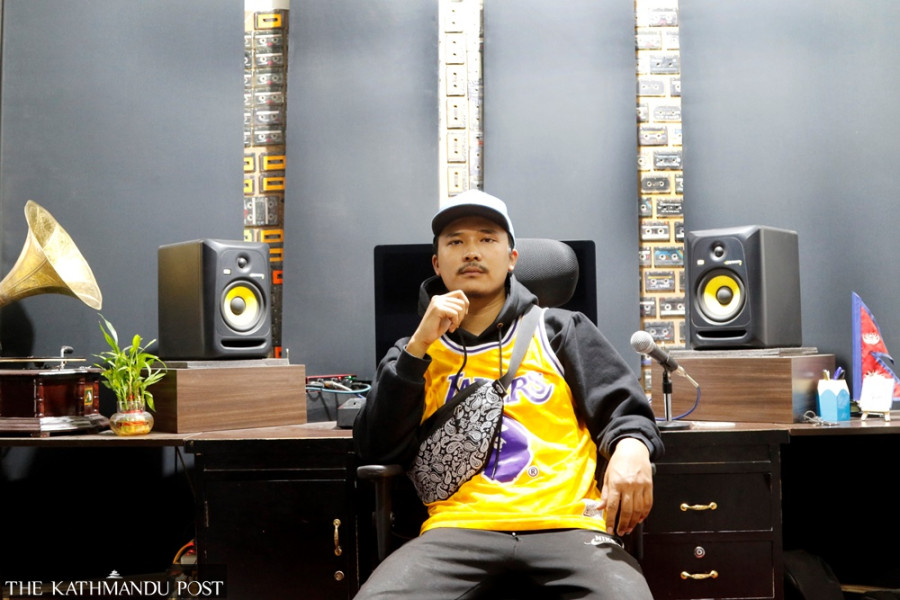Culture & Lifestyle
‘Success that comes quickly usually fades quickly’
One of the most sought-after rap artists Mahesh Dong, aka Dong, on his personal and professional struggles, the changes that Nepal’s rap scene is seeing, and his highly anticipated upcoming project ‘Woda No. 6’.
Pinki Sris Rana
For years, Mahesh Dong, aka Dong, was a name only familiar to those who follow Nepal’s underground rap scene. However, in 2017, Dong released his debut song, ‘Rap Sunn Tero Bauko’, marking his entry into Nepal’s mainstream hip hop scene. Even though the song wasn’t an instant hit, it provided those interested in the music genre a glimpse of Dong’s rhyming skill.
Five years after his debut mainstream track, Dong has firmly established his name as one of the leading artists in Nepal’s rap scene. His most recent album, ‘Pratibimba’, is a smashing hit, and his stint as the host of the popular rap battle show ANTF (All Nepal Thug Family) has helped cement his name in Nepal’s fledgling rap music scene.
Born to a lower-middle-class family in Bhaktapur, Dong, at the age of three, was uprooted along with his family when they all moved to Bauddha. He spent his childhood years in the alleys of Bauddha. Rap music, says Dong, was something he became interested in his teens.
“I would note down lyrics of popular rap songs and would try to rap like the rap artists,” says Dong.
Before pursuing rap music full time, Dong, to support his family, worked a full-time night shift job at a Baneshwor-based foreign outsourcing company.
The job, says Dong, provided a steady source of income, something he needed at the time. But after a year into the job, Dong realised that he had lost more than he had gained.
“Even when I was working full time, I never stopped writing verses. But the job meant that I never had the time I needed to hone my writing or enhance my wordplay skills. So, that was when I decided to quit the job and focus fully on writing and producing my songs,” says 25-year-old Dong.
The majority of Dong's songs reflect the society he has been part of. “I can best write what I have been through myself; that is why my songs are mostly about my experiences. Though these experiences are mine, I know many who have gone through similar experiences, and my goal is to make my songs relatable to people.”
Dong sat and talked with the Post’s Pinki Sris Rana on his journey from being an underground rapper to becoming one of the most sought after rappers in Nepal’s mainstream rap scene, the highs and lows of his personal life, and the reality of what it is like to make a living as a full-time rapper in Nepal.
How did you get interested in rap music?
My journey started in the late 2000s. At the time, b-boying was trending in Kathmandu, and everyone was doing b-boying, pulling off barrel moves. During those days, a lot of workshops on b-boying were also being conducted. The friends I hung out with were all into b-boying as well. I also started b-boying, and the dance form led me to hip hop music. If you look at b-boying, the songs we dance to or the beats we try to sync with are all hip hop songs. The more time I spent b-boying, the more interested I got in hip hop music. By 2011, I had already started writing rap verses, but I had not even thought about pursuing it as a career. I was just doing it to enhance my wordplay skills. One thing led to another and here I am today.
Most of your songs are based on your personal experiences. But many do not know your personal story. Do you mind sharing with us your growing up experience?
I come from lower-middle-class family background, and just like in many families from our economic background, my father went abroad to make a living. So it was my mother who raised my younger sister and me. For most of our lives, we lived in a single rented room. We were poor, but we never realised it because our mother always fulfilled our wishes growing up. After I started visiting my friends' houses for birthday parties, I realised how poor we were. These days when I think about my growing up years, I wonder how my mother managed to provide us with everything and not make us feel the immense challenges she was going through while raising us.
While I was in college, I took a full-time night shift job at an outsourcing company because I had to do my part in lessening the financial burden on my family. When I quit the job to focus on my music career, I had to deal with many things. I was getting recognition as an artist in those early years, but I wasn’t making money, so money was always tight in the family. And in 2019, my mother died in a road accident. We were still dealing with her loss when Covid-19 gripped the country, and then came the lockdown, which put immense financial pressure on our family. During these testing times, my relationship with my father got strained to the point that my sister and I had to leave home.
As someone who has experienced a lot in life, what do you think about your struggles and the success you have achieved?
I personally do not believe in overnight success. A success that comes quickly usually fades quickly. My journey so far has been a gradual one, and during the tough phases in my life, my love for rap music inspired me to keep going.
Back when I was starting out as a musician, I would write songs, record them, and upload them on YouTube, but the songs never gained many views, but this actually never bothered me. During those days, every now and then, my mother would tell me how kids from our neighbourhood came up to her and told her how relatable my music was and how much they liked my songs. Hearing such compliments from people through my mother was what gave me a sense of accomplishment. Of course, the views that my videos get these days do make me happy, but what makes me happiest is when people can resonate with my songs.
In your debut song, ‘Rap Sunn Tero Bauko’, you mention how impossible it is to sustain financially by just making hip hop music. Five years after the song, is it still the case?
Of course, things have changed since ‘Rap Sunn Tero Bauko’ first came out. I have now made it to the mainstream, but it is still challenging to make a decent living by just making rap music, and it is tough for artists who come from my economic background.
Now, if I do a show, I make just about enough to cover my family's expenses for a month or two. To make extra money, I also take on other side projects.
Since the Nepali market is still very small, only a very few rap artists can sustain themselves by focusing just on music. Personally, I don’t think the market can provide for more than three rappers at the same time. For example, when Yama Buddha was alive, it was he, Laure, and GXSOUL that reigned all kinds of musical events. Given our market limitations, event organisers can only afford to have one main artist for an event.
In the last few years, Nepal’s rap scene has started seeing many artists making songs based on their own life experiences. What do you think about the changing landscape of the rap industry?
Until a few years ago, rap artists did not enjoy the liberty that today’s artists do. They did not have the freedom to curse publicly in a song and had to make their content relevant and saleable for that time. I have heard a few instances where people have thrown tomatoes and slippers at rappers and hip hop bands, even though their songs weren’t controversial.
But the rap industry has undergone dramatic changes in the last few years, and there’s no doubt that this current shift is influenced by the West, which is, after all, where this genre of music originated from. But it isn’t just music that is getting influenced by other countries, it’s the same with politics as well. Did Nepal not announce a lockdown after India’s Narendra Modi did? So, the influence will always be there.
A little over a month ago, you released the teaser of your upcoming project ‘Wada No. 6’. The teaser mentions that the project will feature 49 rappers from various parts of the country. Tell us a little about this highly anticipated project.
My friend Bicky Lama, who has been making music for quite a while now, always wanted to work on this project, but initially, he wanted to work just with rappers from Baudhha. But after working on the project for a while, we decided to expand and include 49 rappers from six different states. Rappers are first provided with several workshops on writing rhymes and improving rap flow, and then each of them is given 30 to 40 seconds to rap. The project is basically a rap cypher, and it will be premiered exclusively on YouTube in the coming weeks.




 9.89°C Kathmandu
9.89°C Kathmandu

.jpg&w=200&height=120)













